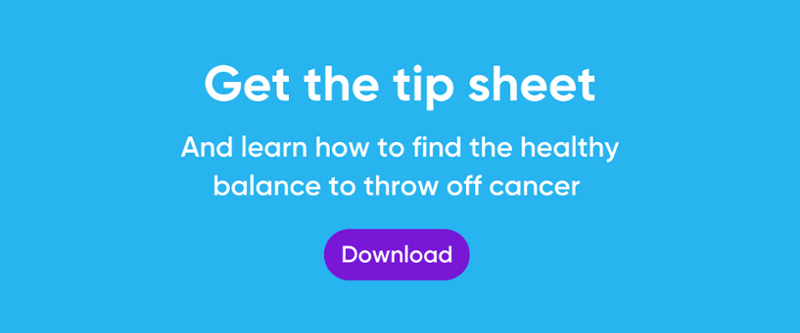More than four out of 10 cancer cases in U.S. adults ages 30 and older are attributable to potentially modifiable causes.1
A healthy diet and lifestyle can reduce your cancer risk
Start making these 10 changes now to transform your general health for years to come:
Whittle your middle
Calculate your body mass index (BMI) to see if you’re at a normal weight. Even if you are, still watch your waistline and belly fat, as higher amounts of body fat are associated with increased risks of a number of cancers.2
Portion your plate
Eat more fruits and vegetables, and less meat, starches, and desserts. Using smaller plates and measuring amounts while cooking are all handy ways to keep your excess intake down too.3
Get moving
Exercise for 30 minutes a week. Break it up—15 minutes twice a week, or 10 minutes three times a week. As long as you’re getting physical activity—rather than, say, watching TV, browsing the web, or playing video games—you’ll get the same health benefits.3
Avoid alcohol
Don’t exceed two alcoholic beverages a day if you’re a man or one beverage a day if you’re a woman.3
Stop smoking
Smoking can cause cancer and then block your body from fighting it by changing or damaging a cell’s DNA and weakening the body’s immune system. While nine out of 10 deaths from lung cancer are caused by cigarette smoking or secondhand smoke exposure, smoking can also cause cancer of the blood; bladder; cervix; colon and rectum; esophagus; kidney and renal pelvis; larynx; liver; lungs, trachea, and bronchus; mouth and throat; pancreas; and stomach.6
→ Download our tip sheet: The healthy balance to throw off cancer [Download Now]
See a red light with red (and processed) meats
Try to avoid lamb, beef, and pork, as they’ve been classified as “probably carcinogenic to humans” by the World Health Organization (WHO). Also avoid processed meats, which include hot dogs, ham, corned beef, beef jerky, and certain deli meats, as they’re classified as “carcinogenic to humans” that can increase cancer risk.4
Take sodium with a grain of salt
90% of Americans consume too much salt.5 Substitute herbs and spices, ensuring you don’t consume more than 2,300 mg of sodium in a day. Check labels on “low-sodium” foods and condiments, as they may still contain a lot of salt.3
Only complement with supplements
Try your best to meet your nutritional needs through diet alone, but if you feel strongly about adding supplements, talk to your doctor—as they aren’t recommended for cancer prevention.3
Cap the sweet tooth
Limit the sugar in your daily caloric intake to 10% or less, avoid eating fast food, and refrain from drinking beverages that are processed or high in added sugar.3
Choose nutritious foods
Aim to eat at least five servings of fruits and vegetables daily; two plant-based foods out of every three servings you consume; and steamed, broiled, microwaved, sautéed, or baked foods vs. fried or cream sauce–covered foods.3
Last updated February 18, 2021
References
1 American Association for Cancer Research. AACR Cancer Disparities Progress Report 2020. https://cancerprogressreport.aacr.org/wp-content/uploads/sites/2/2020/09/AACR_CDPR_2020. pdf. Published 2020. Accessed October 6, 2020.
2 Obesity and cancer. National Cancer Institute Web site. https://www.cdc.gov/healthyweight/assessing/bmi/adult_bmi/english_bmi_calculator/bmi_calculator.html. Updated January 17, 2017. Accessed November 23, 2020.
3 Cancer prevention diet tips. City of Hope Web site. https://www.cityofhope.org/research/research-overview/superfoods-research/cancer-prevention-diet-tips. Accessed January 14, 2021.
4 Cancer: Carcinogenicity of the consumption of red meat and processed meat. World Health Organization Web site. Published October 26, 2015. Accessed November 23, 2020.
5 Paddock C. CDC: 90% of Americans consume too much salt. Medical News Today. January 8, 2016. https://www.medicalnewstoday.com/articles/304833. Accessed November 23, 2020.
6 Smoking and cancer. Centers for Disease Control and Prevention Web site. https://www.cdc.gov/tobacco/campaign/tips/diseases/cancer.html. Updated March 23, 2020. Accessed December 3, 2020.
